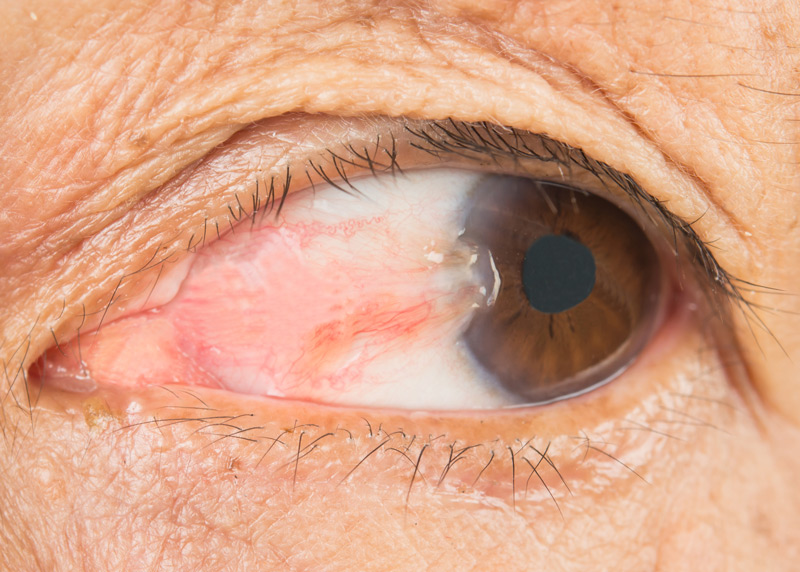Pterygium
Pterygium is a non-cancerous growth of tissue on the conjunctiva, the clear membrane that covers the white part of the eye (sclera). It often extends onto the cornea, the transparent front surface of the eye, and is sometimes called "surfer's eye" because it commonly affects people who spend a lot of time outdoors, especially in sunny environments. The condition is strongly linked to prolonged exposure to ultraviolet (UV) light, which is abundant in sunny, coastal, or tropical areas.
Symptoms can a pterygium cause?
A pterygium can cause a variety of symptoms, which range from mild discomfort to more severe issues affecting vision. While some people may not experience any noticeable symptoms initially, others might develop the following:
Early Symptoms:
- Visible Growth: A raised, fleshy, wedge-shaped growth, usually starting at the inner corner of the eye and extending toward the cornea.
- Redness: The affected area of the eye may appear bloodshot.
- Dry Eye: Caused by disrupted tear film over the growth.
- Watery Eye: The eye may compensate for dryness by overproducing tears.
- Foreign Body Sensation: A feeling like something is in the eye.
- Itching or Burning: Irritation from dryness or inflammation.
- Mild Pain: Some discomfort or sensitivity in the affected eye.
Advanced Symptoms:
- Growth Enlargement: The lesion may grow larger or extend further onto the cornea.
- Difficulty with Contact Lenses: The raised growth can interfere with the proper fit of contact lenses, causing discomfort.
- Vision Changes:
- Blurry Vision: If the pterygium invades the cornea, it can distort its shape, affecting clarity.
- Double Vision: May occur in more severe cases.
Variability in Symptoms:
- Not everyone with a pterygium will experience all these symptoms.
- The severity of symptoms often depends on factors like the size, location, and rate of growth of the pterygium.
- Some pterygia remain small and asymptomatic, while others grow large enough to cause significant discomfort or vision issues.
When to Seek Medical Attention:
- If the growth increases in size.
- If you experience persistent redness, discomfort, or vision changes.
- If wearing contact lenses becomes uncomfortable.
Early management can help control symptoms and prevent complications, especially if the pterygium begins to affect vision or causes significant irritation.
